Note: Yale School of the Environment (YSE) was formerly known as the Yale School of Forestry & Environmental Studies (F&ES). News articles and events posted prior to July 1, 2020 refer to the School's name at that time.
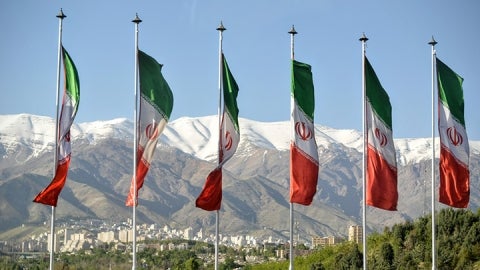
But according to Mary Evelyn Tucker, a senior lecturer and research scholar at the Yale School of Forestry & Environmental Studies (F&ES) and the Yale Divinity School (YDS) many Iranians are more concerned about their deteriorating environment than terrorism. And with the lifting of sanctions, Iran is reaching out to join the international community, she observes.
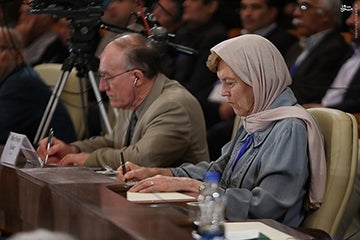 F&ES faculty members John Grim and Mary Evelyn Tucker at the “Second International Seminar on Religion, Culture, and Environment.”
F&ES faculty members John Grim and Mary Evelyn Tucker at the “Second International Seminar on Religion, Culture, and Environment.”
During a recent interview, Tucker discussed the historic conference, her impressions of Iran, and the role of religion in promoting social and environmental change.
This interview has been edited and condensed for clarity.
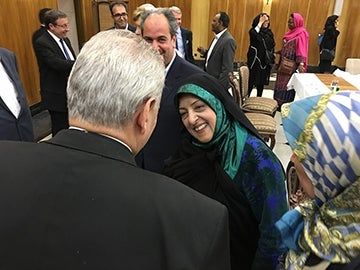 Dr. Masoumeh Ebtekar, Vice President and Head of the Environmental Protection Organization, greets attendees at the conference.
Dr. Masoumeh Ebtekar, Vice President and Head of the Environmental Protection Organization, greets attendees at the conference.
MARY EVELYN TUCKER: John and I went to Iran in June 2001 and May 2005 at the invitation of the Iranian government – the Islamic Republic of Iran – whose [then] President Mohammad Khatami recognized that religion, culture, and values can make a huge difference for environmental attitudes, behavior, change, and solutions. The first two conferences involved the Iranian Environmental Protection Organization and UNEP [United Nations Environment Programme], while this one also included UNESCO [United Nations Educational, Scientific and Cultural Organization]. Earlier, President Khatami called for a Dialogue of Civilizations (that was endorsed by the United Nations) as a means of achieving a peaceful and sustainable future. At the heart of these conferences was this spirit of cultural dialogue for a flourishing of the planet and a recognition that we cannot achieve this without developing a sense of a shared future.
There’s also a real personal element here – namely the efforts of Dr. Masoumeh Ebtekar, Iran’s Vice President and Director of the Environmental Protection Organization under Khatami and Rouhani. She’s been a great inspiration for these conferences because she brings both scientific understanding and ethical valuing of nature. She and many others in this Islamic culture have a deep appreciation for the beauty and complexity of ecosystems and biodiversity.
Q: Our media often portrays Iran as defiant and dangerous, but you’re suggesting that Iran is reaching out and wants to be a part of the world community. In what ways did this conference illuminate this other side of Iran?
TUCKER: All of these conferences are a great education for us and that’s why we go. The biggest learning for us was seeing the reaching out of the Iranian government, which is why cross-cultural exchange is one of the most important things for grounding a sustainable future. We have to ground it in respect for different cultures and difference, and yet find our common ground. And that’s the promise of dialogue among the various world religions. We’re not trying to deny that religions have their problems. But we have also seen their ability to affect social and environmental change. The promise with a conference like this is that we can integrate the future of humans and the planet in new and fresh ways through the lens of culture.
Q: How do you respond to critics of religion who say we simply need more and better science to create a sustainable society?
TUCKER: The empirical method of science is to be celebrated. This is how we have become aware of environmental problems. But when it becomes the only way we view nature, it has limitations. There are other ways of knowing, namely the humanities - the arts, literature, history, philosophy, and religion – where people over the centuries have been inspired about non-quantifiable aspects of life and what sustains us. It’s why we need to affirm multiple ways of knowing nature. This is the promise of environmental humanities, for example.
Scientists in the Ecological Society of America [ESA], and in many other such groups, realize we need the humanities component. We can’t afford to separate sciences and humanities. We have to honor this diversity of knowledge. Just as we value biodiversity so should we appreciate cultural diversity, which is essential to our shared future.
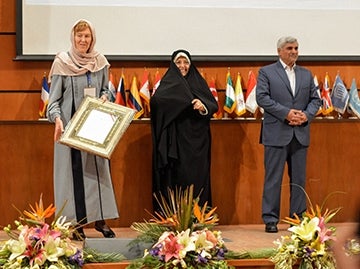 Vice President Ebtekar (middle) presented Mary Evelyn Tucker with the award, signed by President Hassan Rouhani, which recognized Tucker’s achievements in preserving life and the global environment.
Vice President Ebtekar (middle) presented Mary Evelyn Tucker with the award, signed by President Hassan Rouhani, which recognized Tucker’s achievements in preserving life and the global environment.
TUCKER: No. They had already given this same high-level government award to Achim Steiner, the UNEP director, the day before, and they also gave it to an Iranian scholar of Islam and ecology. And then I heard my name being called from the stage. I was really stunned. Flabbergasted. But I think, again, it’s this reaching out of Ebtekar and her colleagues to say, “You and John have created a body of work on world religions and ecology that we value, too.”
Q: The thing that strikes me about the wording in this award is that it’s so sincere. It’s easy to intellectualize these issues, but this award really speaks directly from the heart, from the human experience.
TUCKER: Yes, that is exactly how I felt. It’s heart to heart. It is saying, “How do we speak about the spiritual impact of nature, without being rhetorically religious, or pietistic, or provincial?” Every culture, every religion, has some recognition of that. And so one of the striking things about this award is that they composed it through the lens of their cultural and religious sensibilities. It strikes a chord that’s not provincial, but has a more universal appeal. It rises above a particular tradition into this realization: we’re part of the Earth - something vast, complex, and truly awe inspiring.
Q: The award describes our shared morality to preserve and protect all life. Not exactly the language one would expect in an award signed by the Iranian president.
TUCKER: Yes, this call for all humans to protect the Earth community is part of the Islamic tradition. Yet we misunderstand Islam. I taught world religions for 15 years at Bucknell University before coming to F&ES. Every time I got to Islam - and these were packed classes - I would say, “Okay, what are your conventional ideas? Your stereotypes?” and we would fill the blackboard.
This call for all humans to protect the Earth community is part of the Islamic tradition.
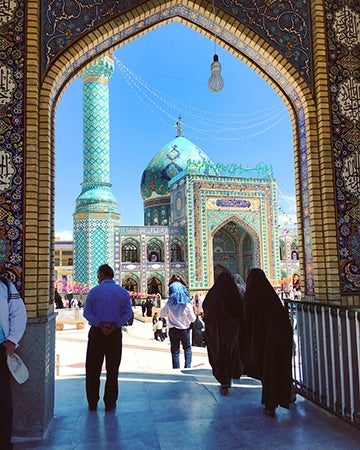 The Imamzdeh Saleh mosque and mausoleum in northern Tehran is a holy site for Iran’s Shia Muslim majority.
The Imamzdeh Saleh mosque and mausoleum in northern Tehran is a holy site for Iran’s Shia Muslim majority.
Q: When you first told me you were going to Iran, I wondered, “Aren’t you scared to go?” which shows how I, too, have bought into this message of fear that all Iranians hate and want to harm Americans.
TUCKER: That’s many people’s reaction - my family, friends, colleagues. It’s very widespread. This is why we have to keep coming back to a dialogue of civilizations, not a clash; getting beyond stereotypes to a deeper understanding; being realistic and pragmatic with awareness of the promise and problems of religion and culture. All of these go together. And that’s the nature of change; we’re living amidst many creative and destructive forces. We need to find the positive forces for change within the world religions. That is what the Papal Encyclical is doing, for example. And that is what I spoke about at the conference – the Pope’s call for an “integral ecology”.
Q: You were there almost a year after the nuclear agreement was signed. What’s your sense of the opportunities that it’s going to bring the Iranian people?
TUCKER: Half the population of Iran is 35 and younger. They’re yearning for a chance to make a living, have a family and provide education for their children – just what most people around the world want. The promise of change and new opportunities is enormous for these young people, even with the naysayers about the nuclear agreement in both the US and Iran.
The Iranian people are eager to make their contribution to a sustainable future.
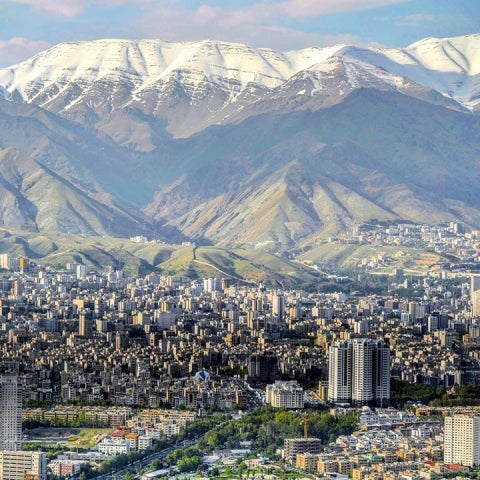 The Alborz mountains lie just north of Tehran, a city of some 10 million and site of the conference. The Iranian people are eager for a more sustainable future, says Tucker.
The Alborz mountains lie just north of Tehran, a city of some 10 million and site of the conference. The Iranian people are eager for a more sustainable future, says Tucker.